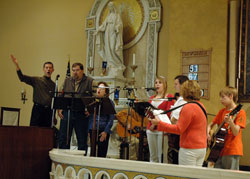Indianapolis to host National Pastoral Musicians convention

Members of St. Mary Parish in New Albany lead a congregation in singing during a Mass celebrated at the parish’s church on Dec. 10, 2006. Liturgical musicians from across the archdiocese and around the country will gather in Indianapolis on July 9-13 for the national convention of the National Association of Pastoral Musicans. (File photo by Sean Gallagher)
By Sean Gallagher
In the next two years, the way that many people experience liturgy in the archdiocese and across the United States will undergo significant changes.
A new text for the Mass will be implemented, and a new Directory for Music and the Liturgy will guide bishops in their review of texts for songs used in the liturgy.
Included in the directory will be a list of standard hymns and songs that will be required to be in all future hymnals and missalettes.
These major developments, as well as the practical ins and outs of leading liturgical music effectively, will be the subject of much discussion at the national convention of the National Association of Pastoral Musicians (NPM) to be held in Indianapolis from July 9-13.
Charles Gardner, liturgical music director for the archdiocese and an NPM board member, sees the convention as a special opportunity for music leaders in archdiocesan parishes as well as people who volunteer in choirs or as cantors or instrumentalists, noting that the convention will have many practical break-out sessions.
“Helping people to prepare to do their job, to raise their skill levels as cantors, as organists, those are consistently needed things,” Gardner said. “Not only will they learn something, but one of the large benefits is to be a part of several thousand people who are like a choir. It gives you a boost.”
He also said that the convention will be an opportunity for those in the archdiocese interested in liturgical music to volunteer to greet the thousands of attendees who will descend upon Indianapolis from across the nation.
“Helping to welcome people here is very [important],” Gardner said. “We want to be hospitable in this town.”
Gardner noted that the uncertainty of what will be happening in the liturgy in the coming years will have an effect on at least one significant part of the convention: people’s buying habits.
“At these conventions, a lot of times people will buy music. And right in this period of transition, the paperback publishers of worship aids have the edge,” he said, “because if you’re going to make an investment in a bound book—even though the great majority of the music isn’t service music—you probably are going to hold back a little bit and say, ‘I want to wait and have the new texts in there.’ ”
Another topic of discussion may be a recent online survey that the NPM undertook to determine the priorities of leaders of pastoral music, on the one hand, and the priorities of those in the congregation, on the other.
The survey, which was not scientific, asked the question, “What helps you to sing the liturgy?”
The most important factor for the 1,541 respondents involved in music ministry was the leadership of organ or instruments (66.4 percent), while only 39.9 percent of those not involved in music ministry said that this was an important factor for them.
According to the survey, the leading aid to help those 808 respondents not involved in a music ministry to sing during Mass was familiarity of the melody (52.2 percent) followed closely by the easy-to-sing nature of a melody (51.4 percent).
These two factors were, respectively, the seventh and eighth most important factors for those involved in music ministry, coming in respectively at 46.7 percent and 43.5 percent.
“This is going to be a matter for discussion, especially in the practical workshops,” Gardner said. “When we give people things to sing, we need to always remind ourselves that people need familiar things.”
Convention participants will be treated to nightly concerts at various locations around the city as well as addresses given by major figures in liturgical music in the United States. Presenters will include Steve Warner, longtime leader of the University of Notre Dame’s Folk Choir, and Paulist Father Ricky Manalo, a composer of liturgical music and writer of books and articles on the liturgy.
Two other well-known liturgical musicians will receive awards at the convention.
Father J. Michael Joncas, a liturgical music composer and a faculty member at the University of St. Thomas in St. Paul, Minn., will receive the NPM’s Jubilate Deo Award, which is given annually to a person who has made a significant contribution to the development of pastoral liturgy or music on the national or international level.
The NPM’s Pastoral Musician of the Year will be awarded to well-known liturgical composer Marty Haugen, also of Minnesota.
(Those interested in attending the convention should log on to www.npm.org and click on the convention’s logo. Those interested in volunteering at the convention should call 317-236-1483 or 800-382-9836, ext. 1483, or log on to www.archindy.org/worship.) †
